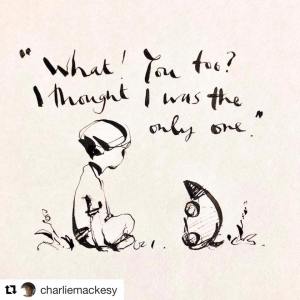Tom Petty was right. I don’t know how it feels to be him. Or anybody else. And no one else knows how I feel, really. And that can be one of the lowest, loneliest feelings, sitting with the fact when it comes to how we feel and what we go through, that we keep running into places and points that we are sure that no one else gets it.
And I think probably we’ve all been there and that we’ll end up back there when it comes to dealing with other people. As close as we get to someone, or as long as we’ve known someone, things can still happen that throw us for a loop and leave us in the land of alone.

Then we have those moments when a glimpse of light shines in. They can often come at seemingly random and unexpected times. As C. S. Lewis put it, “Friendship is born at that moment when one person says to another, ‘What! You too? I thought I was the only one.” I can’t hear that quote now without seeing Charlie Mackesy‘s sketch in my mind. I like that the drawing moves beyond just people.
I go back to a Sunday afternoon during high school when a bunch of us were skimboarding on Boone Creek, a picture perfect Eastern Shore day on the water, when out of nowhere a friend said, “Did you ever have the thought where everyone else in the world is a robot and you are the only real person?” And I stopped in my tracks, astounded that anyone else thought that stuff, because it seemed like a thing that was just for sci-fi books, not conversation with your friends, and I had thoughts like that several times a day.
We all live out different scenarios and imaginings in our heads that we think are only ours. It takes guts to put them out there, and sometimes they fall on deaf ears, but sometimes, there is hope that not everyone else is a robot. Or maybe that is part of their robot plan 😉
The funny thing is, the older we get and the more of those thoughts we have stored up, the more quirky we feel like they are to the point where we are sure no one else could understand. And we’ve had more time and experience to be broken, to feel lost, to be confused. So when a connected moment like that happens, we can almost lose our breath.
Shared connected moments are sometimes just that: moments. Encouragement and affirmation; a nudge to keep going. Maybe we can share ourselves and provide a moment like that for someone else, maybe we encounter someone who does that for us.
I know when it comes to parenting right now, I have a 16 year old who might as well be quoting Tom Petty in just about any conversation we have. And sometimes I say, you know, at 46 I still feel that way. Sometimes people don’t know how it feels. But we all share that feeling, of not being understood. Of no one getting it, or us.
And that comes in different waves and different depths. T. H. White, in his book “The Once and Future King,” throws the full depth of that struggle out there:

“There was a time when each of us stood naked before the world, confronting life as a serious problem with which we were intimately and passionately concerned. There was a time when it was of vital interest to us to find out whether there was a God or not… Further back, there were times when we wondered with all our souls what the world was, what love was, what we were ourselves.”
I dig those kind of questions and that kind of discussion. But in our busy lives, it doesn’t have to run that deep. Sometimes it’s just wondering if anyone else puts their hand out for lightning bugs to land on, or still skips shells, or likes hot sauce on their eggs, or tries to find their own new constellations when they look at the stars.
But I think part of what I take from White, part of what I want to tell my daughter, part of what I need to remind myself, is that before we get too caught up with whether anyone else feels what we feel, we first have to spend time with, reflect on, pray on, understand what we ourselves are feeling.
We don’t know what it feels like to be Tom Petty. Do we really know what it feels like to be ourselves?
“Your visions will become clear only when you can look into your own heart. Who looks outside, dreams; who looks inside, awakes.” – Carl Jung
Who are you when you look into the fire of your own heart? Then let’s ask what we do with that in the world.














 y mind to see my life reflected in a 6-mile paddle–for memories and mistakes, for joy and love and dreams, for connection to place and to You and Your creation. Thank you for not giving up on me when I was distant from you. Thank you for ears to hear your voice.
y mind to see my life reflected in a 6-mile paddle–for memories and mistakes, for joy and love and dreams, for connection to place and to You and Your creation. Thank you for not giving up on me when I was distant from you. Thank you for ears to hear your voice.